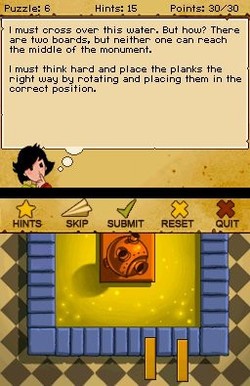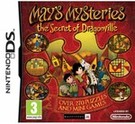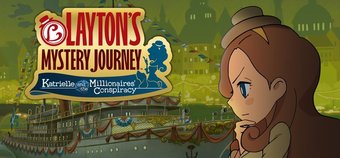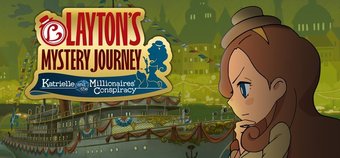If Professor Layton was more into giving advice on proverbs than solving mind-bending, logic based puzzles, he'd likely have told his young apprentice Luke that "Imitation is the most sincere form of flattery." When we first saw May's Mysteries way back when, we though the same thing - here was a game that, in all but name, was another Professor Layton. Though she's certainly missing a hat, May's Mysteries looked set to offer the same mix of point and click exploration, involving storylines, and, most importantly, brain teasing puzzles that we've come to know and love from the puzzling Professor. The only problem is, as is the case with most tribute acts, May's Mysteries isn't quite as good as the real thing.
That said, it's not like the game doesn't try to get off to the best of starts. Like Professor Layton, things open with a fancy animated cutscene, which shows May, and her brother, getting in a balloon for a flight. No sooner have they taken off, however, then they run into trouble, as suddenly, the sky clouds over, and they go head first into a thunderstorm. Things only get worse when their pilot falls overboard - and the balloon crash lands. Coming to, May finds herself in Dragonville - a strange town where the people are running scared of an evil Mayor, and, somewhat strangely, there's not a single child in sight. Worse still, May's clodhopping brother manages to find himself being kidnapped - and so May takes it upon herself to track him down, and rescue him.

Touch the compass, and it'll show you where you can move, and what you can interact with. Give the old lady a poke.
As we may have mentioned once or twice now, the general premise here will be very similar if you've ever played a Professor Layton game. With a whole town to explore, you'll move from scene to scene by touching the move button, and then touching the arrow that points in the direction you want to go. Sadly, unlike Layton, the scenes you explore are entirely static, and there are no hidden puzzles to be found by clicking around the scene - if there's not a person there, and pressing the move button doesn't highlight anything you can interact with, all that's left to do is to simply move onto the next area.
As you move around the town, you'll regularly find yourself coming across people, who'll often refuse to help you unless you solve a puzzle for them. Just like in real life then.
The puzzles make up the lifeblood of May's Mysteries, and, as you may hope, there's a wide variety of challenges on offer. From Piccross style puzzles, to lengthy, word based logic ones, and even a few picture slider puzzles, where you've just got to rearrange tiles to form a picture, there's a puzzle in here that everyone'll be able to do - but, sadly, there's also a few that you can't.
Possibly the biggest problem here is that so much of May's Mysteries has been lost in translation. The game's obviously been localised into English from a foreign language due to some of the more... unique phrasings you'll come across, but the problem is, this often actually results in questions becoming ambiguous, hints becoming useless, and, in extreme cases, answers actually wrong.
There's also a reliance on actually being able to do maths in May's Mysteries, unlike Professor Layton. In Layton, there was always a logical way to solve the puzzle without having to resort to pulling out the old calculator, but an early puzzle in May's Mysteries forces you to put your sum skills to the test.

This is an early, but awkward puzzle. The right answer leaves you with two planks that only barely touch each other, meaning you don't actually expect it to be right.
"Melanie, the poor librarian, has been given the task of hand numbering the pages of a book. She writes 1128 digits. How many pages are there?"
Unlike Layton, there's no easy, logical way to solve this. All you can do is hard nose it, and do it the old fashioned way. Pages 1 - 9 have one digit each, pages 10 - 99 have two digits each, so that's 189 digits to begin with. Take 189 from 1128, and you're left with 939, divide by three to get 313, and add on the 99 pages you've already counted to be left with 412. It's not easy, and at the same time, it's not a massive problem that it uses proper maths, but we just thought you ought to be aware.
Another asks about a crystal ball. "If the Fortuneteller's crystal ball weighs 1kg plus one half of a crystal ball, how heavy are three crystal balls". Answers on a post card. Half of the challenge, it seems, is figuring out the question. Using a bit of basic algebra, if the crystal ball (X) weighs 1 kg plus one half of a crystal ball, then x = 1kg + 1/2x, so x - 1/2x = 1kg, which means 1/2x = 1kg. So x is 2 kg, and 3 crystal balls weigh 6kg. See what we mean about being tricky? If you're the sort of person who sees a graph, thinks "Argh! Maths!" and dives through the nearest window, May's Mysteries isn't a game for you - for the rest, you'll need a notepad nearby, as the game sadly doesn't let you take notes in-game.
Adding to the problems caused by the ambiguous, and often lost-in-translation wording is the fact that, when you get a question wrong, you have to click through the entire conversation again. What that means in practice is, rather than simply being able to try a puzzle again, when you get it wrong, you'll often have to click through up to thirty pieces of text to have another go. When the questions are as tricky as they are, that's a big mistake, as it means you end up spending more time clicking through a conversation you've already read fifteen times, than you actually do solving puzzles.
Another minor disappointment is that there's no explanation of the correct solution after you've solved a puzzle. Whereas Layton went to great lengths to explain how you're meant to figure puzzles out, if you've managed to just guess your way to the answer, there's no such explanation here, which was something we sorely missed.
As you make your way through the game solving the puzzles, you'll gradually unlock more, bonus puzzles, which is where the majority of the game's brain teasers lie. While the game promotes some 270 puzzles, the vast majority of those are bonus puzzles you unlock, which can then be completed at any time to earn hint points, which, unsurprisingly, give you hints to certain puzzles, and also let you skip over any particularly nasty ones. By making you dip into the bonus puzzles in order to keep your hint coins stacked up, and by offering you such a huge spread to choose from, May's Mysteries adds to its total playtime, without becoming too tricky, letting you pick and choose at your favourite categories of puzzles when you start to get stuck in the game.
It's not as if May's Mysteries doesn't try to bring anything new to the formula, either. Hidden object stages break up the action as you go along, and are mostly well done (although the objects are sometimes a bit on the tiny side), while other, rhythmic puzzles ask you to listen to a tune, and then tap the same rhythm back. And luckily, not every puzzle is a tricky as the examples above. There are plenty of reasonable (and sometimes even too easy) puzzles in here to solve, from the usual "divide this field using only straight lines so each contains four cows, two sheep and a donkey" puzzles, and a whole variety of other puzzles that wouldn't be out of place in a Layton game - it's just the strangely worded, ambiguous, or sometimes wrongly answered questions pop up a little bit too often for our liking, and serve as something of a downer for the game.
WIth a little bit of extra polishing and time spent over the localisation (and the removal of making you click through entire conversations to redo a puzzle), May's Mysteries could have been a real contender to Layton's crown. Sadly, as it stands, it's left polishing the triumphant Professor's boots.
Format Reviewed: Nintendo DS





















